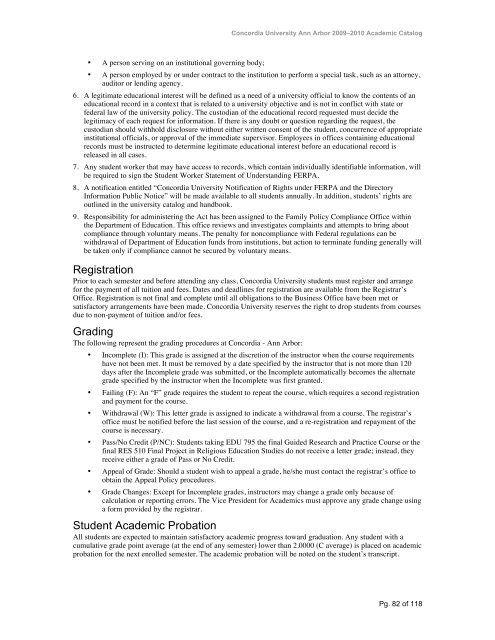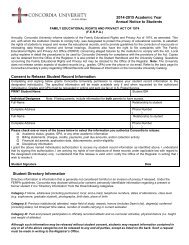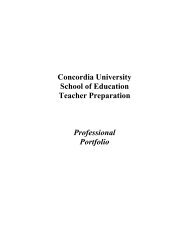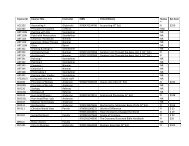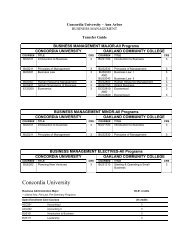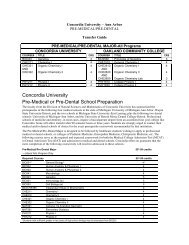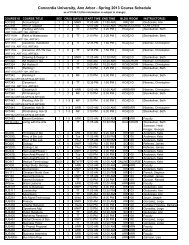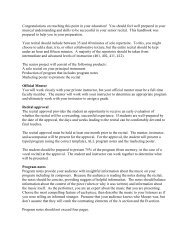2009â2010 Academic Catalog - Concordia University Ann Arbor
2009â2010 Academic Catalog - Concordia University Ann Arbor
2009â2010 Academic Catalog - Concordia University Ann Arbor
You also want an ePaper? Increase the reach of your titles
YUMPU automatically turns print PDFs into web optimized ePapers that Google loves.
<strong>Concordia</strong> <strong>University</strong> <strong>Ann</strong> <strong>Arbor</strong> 2009–2010 <strong>Academic</strong> <strong>Catalog</strong><br />
• A person serving on an institutional governing body;<br />
• A person employed by or under contract to the institution to perform a special task, such as an attorney,<br />
auditor or lending agency.<br />
6. A legitimate educational interest will be defined as a need of a university official to know the contents of an<br />
educational record in a context that is related to a university objective and is not in conflict with state or<br />
federal law of the university policy. The custodian of the educational record requested must decide the<br />
legitimacy of each request for information. If there is any doubt or question regarding the request, the<br />
custodian should withhold disclosure without either written consent of the student, concurrence of appropriate<br />
institutional officials, or approval of the immediate supervisor. Employees in offices containing educational<br />
records must be instructed to determine legitimate educational interest before an educational record is<br />
released in all cases.<br />
7. Any student worker that may have access to records, which contain individually identifiable information, will<br />
be required to sign the Student Worker Statement of Understanding FERPA.<br />
8. A notification entitled “<strong>Concordia</strong> <strong>University</strong> Notification of Rights under FERPA and the Directory<br />
Information Public Notice” will be made available to all students annually. In addition, students’ rights are<br />
outlined in the university catalog and handbook.<br />
9. Responsibility for administering the Act has been assigned to the Family Policy Compliance Office within<br />
the Department of Education. This office reviews and investigates complaints and attempts to bring about<br />
compliance through voluntary means. The penalty for noncompliance with Federal regulations can be<br />
withdrawal of Department of Education funds from institutions, but action to terminate funding generally will<br />
be taken only if compliance cannot be secured by voluntary means.<br />
Registration<br />
Prior to each semester and before attending any class, <strong>Concordia</strong> <strong>University</strong> students must register and arrange<br />
for the payment of all tuition and fees. Dates and deadlines for registration are available from the Registrar’s<br />
Office. Registration is not final and complete until all obligations to the Business Office have been met or<br />
satisfactory arrangements have been made. <strong>Concordia</strong> <strong>University</strong> reserves the right to drop students from courses<br />
due to non-payment of tuition and/or fees.<br />
Grading<br />
The following represent the grading procedures at <strong>Concordia</strong> - <strong>Ann</strong> <strong>Arbor</strong>:<br />
• Incomplete (I): This grade is assigned at the discretion of the instructor when the course requirements<br />
have not been met. It must be removed by a date specified by the instructor that is not more than 120<br />
days after the Incomplete grade was submitted, or the Incomplete automatically becomes the alternate<br />
grade specified by the instructor when the Incomplete was first granted.<br />
• Failing (F): An “F” grade requires the student to repeat the course, which requires a second registration<br />
and payment for the course.<br />
• Withdrawal (W): This letter grade is assigned to indicate a withdrawal from a course. The registrar’s<br />
office must be notified before the last session of the course, and a re-registration and repayment of the<br />
course is necessary.<br />
• Pass/No Credit (P/NC): Students taking EDU 795 the final Guided Research and Practice Course or the<br />
final RES 510 Final Project in Religious Education Studies do not receive a letter grade; instead, they<br />
receive either a grade of Pass or No Credit.<br />
• Appeal of Grade: Should a student wish to appeal a grade, he/she must contact the registrar’s office to<br />
obtain the Appeal Policy procedures.<br />
• Grade Changes: Except for Incomplete grades, instructors may change a grade only because of<br />
calculation or reporting errors. The Vice President for <strong>Academic</strong>s must approve any grade change using<br />
a form provided by the registrar.<br />
Student <strong>Academic</strong> Probation<br />
All students are expected to maintain satisfactory academic progress toward graduation. Any student with a<br />
cumulative grade point average (at the end of any semester) lower than 2.0000 (C average) is placed on academic<br />
probation for the next enrolled semester. The academic probation will be noted on the student’s transcript.<br />
Pg. 82 of 118


